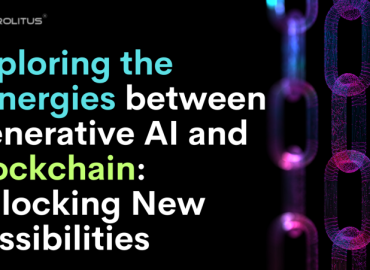In the ever-evolving landscape of blockchain technology, one critical aspect remains at the forefront of discussions and innovations: privacy. As the world becomes increasingly interconnected, safeguarding sensitive data and transactions has become paramount. Transparent blockchains, while revolutionary, have raised concerns about the exposure of confidential information. This is where Blockchain zero knowledge proof enters the scene. In this exploration of blockchain’s future, we embark on a journey to understand the vital role of privacy in this space. We’ll delve into the mechanics of Zero-Knowledge Proofs, explore their profound advantages, and peek into the horizon of emerging privacy technologies. Join us as we uncover the future of blockchain privacy – a realm that extends far beyond ZKP alone.
Understanding the Need for Privacy in Blockchain
Blockchain technology, often hailed as a paradigm shift in how we manage data and transactions, has surged into various industries with the promise of transparency, security, and decentralization. However, one crucial aspect that has garnered increasing attention is the need for privacy within blockchain networks.
At its core, a blockchain is a public ledger that records every transaction across its network. While this transparency can be advantageous, it presents significant challenges in scenarios where confidentiality is paramount. Consider, for instance, financial transactions. In a fully transparent blockchain, anyone can trace the flow of funds, potentially exposing sensitive financial information. This lack of privacy is a glaring concern.
Furthermore, public blockchains pose risks such as front-running, where malicious actors exploit predictable transaction behavior, leading to losses for legitimate users. Privacy breaches, identity exposure, and corporate espionage are also potential consequences in the absence of robust privacy measures.
Privacy is not merely a matter of convenience; it’s a fundamental requirement for blockchain to achieve mainstream adoption. Without adequate privacy, individuals and organizations may hesitate to engage with blockchain technology in areas where data confidentiality is crucial.
What is Zero Knowledge Proof ? How Zero-Knowledge Proofs is solving scalability Issues with businesses?
A zero-knowledge proof is a cryptographic technique that enables the verification of a statement’s validity without disclosing the actual statement itself. In this process, the ‘prover’ seeks to demonstrate the truth of a claim, while the ‘verifier’ is tasked with confirming the claim’s accuracy.
The concept of zero-knowledge proofs was first introduced in a seminal paper published in 1985, titled “The Knowledge Complexity of Interactive Proof Systems.” This paper laid the foundation for the widely accepted definition of zero-knowledge proofs that is employed today:
Zero-knowledge proofs have evolved significantly since their inception and are now finding practical applications in various real-world scenarios. Their ability to enhance privacy and security while establishing trust continues to drive their adoption in diverse domains.
Zero-Knowledge Proofs (ZKPs) are emerging as a powerful solution to address scalability issues in businesses, particularly in the realm of blockchain and data privacy. With the ever-increasing volume of transactions and data transfers, scalability has become a paramount concern. ZKPs offer a game-changing approach by enabling the validation of information without the need to disclose the data itself.
In the context of blockchain technology, ZKPs can significantly enhance scalability. Traditional blockchains often face bottlenecks when processing a large number of transactions, resulting in slower confirmation times and increased costs. ZKPs allow for the aggregation of multiple transactions into a single proof, reducing the computational load on the network. This means faster transaction processing and lower fees, making blockchain technology more viable for everyday use.
Moreover, ZKPs play a pivotal role in data privacy, a critical aspect for businesses in various industries. By employing ZKPs, companies can conduct data validation without exposing sensitive information. This is particularly valuable in sectors like healthcare and finance, where strict privacy regulations are in place. ZKPs enable secure data sharing and collaboration, fostering innovation while maintaining compliance with data protection laws.
Beyond Zero-Knowledge Proofs: Future Privacy Technologies
While zero-knowledge proofs (ZKPs) have undoubtedly emerged as a groundbreaking solution for enhancing blockchain privacy, they are not the final destination in the quest for unparalleled data protection. Understanding their limitations paves the way for exploring an array of promising future privacy technologies.
Privacy-Enhancing Cryptocurrencies: As blockchain adoption continues to grow, privacy-focused cryptocurrencies like Monero and Zcash gain prominence. These cryptocurrencies integrate advanced cryptographic techniques to ensure user anonymity and transaction confidentiality. They represent a significant step forward in the pursuit of financial privacy.
Homomorphic Encryption: Homomorphic encryption allows computations on encrypted data without decrypting it first. In the blockchain context, this technology could enable smart contracts to perform operations on encrypted data while preserving user privacy. It opens doors to secure decentralized applications with broader utility.
Layer 2 Scaling Solutions: As blockchain networks face scalability challenges, Layer 2 scaling solutions like zkRollups and Optimistic Rollups are gaining traction. These technologies enhance privacy by batching multiple transactions into a single proof, reducing the exposure of sensitive information on the main chain.
Multi-Party Computation (MPC): MPC protocols enable multiple parties to jointly compute a function over their inputs while keeping those inputs private. In blockchain, MPC can revolutionize collaborative processes, such as decentralized exchanges, by allowing users to trade assets without revealing their intentions.
Real-World Applications of Enhanced Blockchain Privacy
Blockchain’s potential is boundless, but to fully harness it, privacy is paramount. In this section, we shed light on the tangible, real-world applications that stand to benefit from advanced blockchain privacy solutions.
Finance and Banking: Enhanced privacy enables confidential transactions, offering financial institutions a way to ensure compliance with regulations while protecting customer data. Projects like confidential assets on blockchain networks are gaining momentum.
Healthcare: Secure sharing of medical records and health data is vital. Blockchain’s privacy enhancements empower patients to control their data while allowing healthcare providers to collaborate efficiently without compromising sensitive information.
Supply Chain: The transparency of blockchain meets the need for traceability and authenticity. Privacy features can protect sensitive business data while ensuring transparency in supply chains, reducing fraud and errors.
Voting Systems: Privacy-preserving blockchain voting systems enhance election security and eliminate concerns about vote manipulation. Voters can trust in the sanctity of their choices.
Legal and Intellectual Property: Protecting sensitive legal documents and intellectual property is a priority. Blockchain privacy can safeguard confidential legal agreements and patents while enabling secure sharing.
Challenges and Adoption Hurdles
Zero-Knowledge Proofs (ZKPs) are a powerful cryptographic tool, but their widespread adoption faces several challenges and hurdles. One primary obstacle is the complexity of implementing ZKPs in real-world applications. Developing ZKP systems requires a deep understanding of advanced mathematics and cryptography, making it a daunting task for many developers and organizations. This complexity can lead to longer development cycles and increased costs.
Another significant challenge lies in the computational overhead associated with ZKPs. Verifying ZKPs can be computationally intensive, potentially slowing down transaction processing times, especially in blockchain applications where speed and scalability are essential. As a result, optimizing the performance of ZKP systems is a critical concern for their adoption.
Moreover, ZKPs need to gain broader recognition and trust within industries and among users. Building confidence in the security and reliability of ZKPs is crucial, as the technology is still relatively new in many sectors. Addressing concerns related to potential vulnerabilities and ensuring rigorous testing will be essential to overcome these adoption hurdles.
Interoperability is another challenge. ZKPs need to seamlessly integrate with existing systems and protocols, which can be complex, as different platforms may have varying compatibility requirements.
Despite these challenges, ZKPs hold immense promise in enhancing privacy and security across various applications, from blockchain and cryptocurrencies to identity verification and data sharing. As technology continues to evolve, addressing these hurdles will be vital in unlocking the full potential of Zero-Knowledge Proofs and making them a standard tool in the digital age.
The Road Ahead: What to Expect
Continued Evolution: The future of blockchain privacy promises continuous evolution, with new techniques and technologies continually emerging.
Interoperability: Expect greater efforts to enhance interoperability among different blockchains while maintaining robust privacy measures.
Regulatory Developments: Keep an eye on how governments and regulatory bodies adapt to the growing need for privacy in blockchain, which may impact the industry’s direction.
Mainstream Integration: As privacy solutions mature, anticipate blockchain technology becoming more integrated into mainstream industries, including finance, healthcare, and supply chain management.
Enhanced User Control: Users will likely gain more control over their private data and transactions, with user-centric privacy solutions on the rise.
Cross-Chain Privacy: Developments in cross-chain privacy protocols will enable secure and private transactions across various blockchains.
As we look to the future, the path of blockchain privacy is laden with opportunities and challenges, promising a dynamic and transformative journey ahead.
Final Thoughts
In conclusion, the future of blockchain privacy is a realm ripe with promise and potential. Throughout this exploration, we’ve unveiled the critical significance of privacy in blockchain, dissected the inner workings of zero-knowledge proofs (ZKPs), and glimpsed at the horizon of emerging privacy-enhancing technologies. As blockchain continues to transform industries, robust privacy solutions will play an indispensable role in safeguarding sensitive data and bolstering user trust. While ZKPs have proven to be a powerful tool in this quest, they represent just the beginning. The road ahead promises exciting developments, and the blockchain industry’s commitment to enhancing privacy ensures a more secure and confidential digital future for all. Stay tuned, for the journey has only just begun.
Why Choose Prolitus as Your Blockchain development Partner
Prolitus stands out as a premier, Solana blockchain development company, making it the ideal choice for your blockchain needs. With a relentless commitment to innovation and a proven track record, Prolitus excels in crafting cutting-edge blockchain solutions tailored to your specific requirements.
Our team of experienced blockchain experts possesses an in-depth understanding of the technology’s intricacies, ensuring the creation of secure, scalable, and efficient blockchain applications. We prioritize transparency and collaboration, working closely with clients to transform their ideas into reality.
Choosing Prolitus as your blockchain partner means access to a wide range of services, from initial consultation and ideation to full-scale development and ongoing support. Trust in Prolitus for top-tier blockchain solutions that drive your business forward in this rapidly evolving digital landscape.





